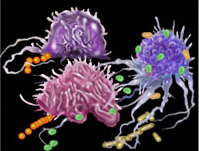Oral Infection and Immunity Branch
Cellular Immunology Section, OIIB
 |
| Host-pathogen interactions |
Inflammation and Host-pathogen interactions
NATIONAL INSTITUTES OF HEALTH/NIDCR
BUILDING 30 ROOM 320
30 CONVENT DR MSC 4352
BETHESDA MD 20892-4352
Phone: (301) 496-4178
Fax: (301) 402-1064
E-mail: smwahl@mail.nih.gov
Research Interests
Normal and Pathologic Mechanisms of Inflammation, Innate and Acquired Immunity
Our research program focuses on the cellular, biochemical and molecular mechanisms that regulate the inflammatory process and how their dysregulation may contribute to the development of infectious and autoimmune diseases. Identification of underlying signaling pathways provides insight into targets for agonistic and antagonistic intervention in immunopathologic conditions. One endogenous immunoregulator is secretory leukocyte protease inhibitor (SLPI), which has newly recognized functions in innate and adaptive host defense beyond its ability to inhibit serine proteases. SLPI inhibits HIV and other infectious pathogens, and SLPI null mice are susceptible to aberrant wound healing as well as infectious, autoimmune and allergic/asthmatic diseases. Defining its receptor(s), signaling pathways, and functional consequences has revealed its ability to regulate TGF-beta activation. TGF-beta, a powerful immunoregulatory molecule, contributes to Treg and Th17 lineage commitment, linked to autoimmunity and altered susceptibility to infectious diseases.
Combining animal models with in vitro analyses, we can examine the effects of different therapeutic modalities on the development and progression of disease. In dissecting innate immune pathways in infectious diseases, including HIV, a family of intracellular cytidine deaminases (APOBEC3) with innate anti-viral properties can be regulated by IFN in vitro and in HIV-positive patients as a counterattack to the virus. Investigating additional host cell molecules that inhibit or enhance the viral life cycle may implicate strategies to alter the balance between virus and host.
Education
B.S., Pacific Lutheran University (Tacoma, WA)
Ph.D., University of Washington School of Medicine (Seattle, WA)
Recent publications
Ashcroft, G.S., Lei, K. Jin, W. Longenecker, G., Kulkarni, A.B., Greenwell-Wild, T., Hale-Donze, H., McGrady, G., Song, X.Y. and Wahl, S.M. 2000. Secretory leukocyte protease inhibitor mediates non-redundant functions necessary for normal wound healing. Nature Med. 6(10): 1147-53.
Chen, W., Frank, M.E., Jin, W. and Wahl, S.M. 2002. TGF-beta released by apoptotic T cells contributes to an immunosuppressive milieu. Immunity 14:715-725.
Chen, W., Jin, W., Lei, K-j., Hardegen, N., Li, L., Marinos, N. and Wahl, S.M.: 2003. Conversion of peripheral CD4+CD25- naive T cells to CD4+CD25+ regulatory T cells by TGF-beta induction of transcription factor Foxp3. J. Exp. Med. 198:1875-86.
Wahl, S.M., Vàzquez, N. and Chen, W. 2004. Regulatory T cells and transcription factors: gatekeepers in allergic inflammation. Curr. Opin. Immunol. 16(6): 768-774.
Ma, G., Greenwell-Wild, T., Lei, K-j., Jin, W., Hardegen, N. and Wahl, S.M. 2004. Secretory leukocyte protease inhibitor (SLPI) binds to annexin 2, a cofactor for macrophage HIV-1 infection. J. Exp. Med. 200(10):1337-1346.
Vázquez, N., Greenwell-Wild, T., Marinos, N., Swaim, W., Nares, S., Orenstein, J.M., Sporn, M.B. and Wahl, S.M. 2005. HIV-1 induced macrophage gene expression includes p21, a potential host cell target for viral regulation. J. Virol. 79:4479-91.
Peng, G., Lei, K-j., Jin, W., Greenwell-Wild, T. and Wahl, S.M. 2006. Induction of APOBEC3 family proteins, a defensive maneuver underlying interferon-induced anti-HIV activity. J. Exp. Med. 203:41-6.
Mangan, P.R., Harrington, L.E., Quinn, D.B., Bullard, D.C., Elson, C.O., Hatton, R.D., Wahl, S.M., Schoeb, T.R. and Weaver, C.T. 2006. Transforming Growth Factor-b induces development of the TH17 lineage. Nature 441(7090):231-34.
Wahl SM. 2007. Transforming growth factor-beta: innately bipolar. Curr. Opin. Immunol. Feb;19(1):55-62. Epub 2006 Nov 28.
Peng G, Greenwell-Wild T, Nares S, Jin W, Lei KJ, Rangel ZG, Munson PJ, Wahl SM. Myeloid differentiation and susceptibility to HIV-1 are linked to APOBEC3 expression. Blood 2007 Jul 1;110(1):393-400.
Fellows/Staff